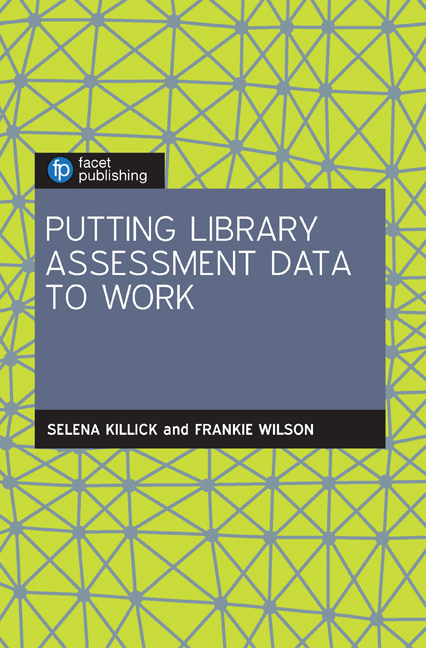Book contents
- Frontmatter
- Dedication
- Contents
- List of figures and tables
- List of case studies
- Authors and contributors
- Acknowledgements
- 1 Introduction to Library Assessment
- 2 Institutional Measures of Student Satisfaction
- 3 Standardised Library Surveys
- 4 In-House Library Surveys
- 5 Library Statistics
- 6 Qualitative Feedback
- 7 Emerging Techniques
- 8 More than Measuring: using Assessment Holistically
- 9 Conclusions
- Index
6 - Qualitative Feedback
Published online by Cambridge University Press: 02 October 2019
- Frontmatter
- Dedication
- Contents
- List of figures and tables
- List of case studies
- Authors and contributors
- Acknowledgements
- 1 Introduction to Library Assessment
- 2 Institutional Measures of Student Satisfaction
- 3 Standardised Library Surveys
- 4 In-House Library Surveys
- 5 Library Statistics
- 6 Qualitative Feedback
- 7 Emerging Techniques
- 8 More than Measuring: using Assessment Holistically
- 9 Conclusions
- Index
Summary
Chapter overview
Academic libraries receive a huge amount of qualitative data about what custom - ers want, and how they are performing. This might be explicitly sought via a survey as discussed in chapters two, three and four, or through qualitative research techniques, such as focus groups and interviews. Alternatively, it may be unsolicited via social media, a feedback book, a form on the library website, or simply from interactions with library staff. How can this data be harnessed to improve the library? How can the data be analysed? Should we make changes based on one person's opinion?
This chapter describes how libraries can get more from such feedback: by using it to answer future business questions; and through undertaking deeper analysis to gain insights. It also describes how to address some of the common challenges that arise when using qualitative data. Each area is illustrated by one of the three case studies:
• Case Study 6.1 Breaking out of the silos: taking the holistic view of customer feedback at Cranfield University (Selena Killick, Open University)
• Case Study 6.2 Digging deeper: using qualitative data analysis of survey feedback to inform library strategy at the University of Oxford (Frankie Wilson, University of Oxford)
• Case Study 6.3 Let the computer take the strain: automatic analysis of LibQUAL+ free-text comments at Singapore Management University Libraries (Tamera Hanken, Xavier University of Louisiana).
Using qualitative data to improve customers’ experience
Libraries rarely need to employ a full qualitative research design, such as that espoused in the social science methodological literature (e.g. Denzin and Lincoln, 2005). Nor is it usually appropriate to apply true grounded theory techniques, such as those described by Anselm Strauss (e.g. Strauss and Corbin, 1998) to qualitative data analysis. Therefore, if someone who wishes to analyse their customer feedback trawls along the shelves in the qualitative methodology section of a library they are likely to conclude that it is too time consuming and complex. However, by applying the principles of such methods judiciously, qualitative feedback can be used to drive change without the risk of the library being accused that it is merely responding to those who shout the loudest.
- Type
- Chapter
- Information
- Putting Library Assessment Data to Work , pp. 99 - 122Publisher: FacetPrint publication year: 2019



